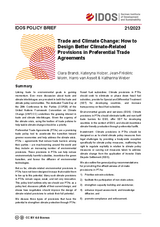Trade and climate change: how to design better climate-related provisions in preferential trade agreements
Brandi, Clara / Kateryna Holzer / Jean-Frédéric Morin / Harro van Asselt / Katharina WeberPolicy Brief (21/2023)
Bonn: German Institute of Development and Sustainability (IDOS)
DOI: https://doi.org/10.23661/ipb21.2023
Linking trade to environmental goals is gaining momentum. Ever more discussion about trade and climate interlinkages are prevalent in both the trade and climate policy communities. The dedicated Trade Day at the 28th Conference to the Parties (COP28) of the United Nations Framework Convention on Climate Change (UNFCCC) underlines the growing interest in trade and climate interlinkages. Given the urgency of the climate crisis, using the toolbox of trade policies to help tackle climate change should be a priority. Preferential Trade Agreements (PTAs) are a promising trade policy tool to accelerate the transition toward greener economies and help address the climate crisis. PTAs – agreements that reduce trade barriers among their parties – are mushrooming around the world and they include an increasing number of environmental provisions. These provisions in PTAs can help reduce environmentally harmful subsidies, incentivise the green transition, and favour the diffusion of environmental technologies. But so far, climate-related environmental provisions in PTAs have not been designed in ways that enable them to live up to this potential. Many such climate provisions in PTAs remain vague, weak, and not very innovative. This policy brief outlines why we should use PTAs as a policy tool; discusses pitfalls of their current design; and shows how negotiators should improve the design of climate-related provisions to unlock their full potential. We discuss three types of provisions that have the potential to strengthen climate protection through PTAs:
Fossil fuel subsidies: Climate provisions in PTAs should seek to eliminate or phase down fossil fuel subsidies, provide for Special and Differential Treatment (SDT) for developing countries, and increase transparency on fossil fuel subsidies.
Environmental goods and services (EGS): Climate provisions in PTAs should eliminate tariffs and non-tariff trade barriers for EGS, offer SDT for developing countries in the context of EGS, and should incentivise climate-friendly production through preferential tariffs.
Investment: Climate provisions in PTAs should be designed so as to shield climate policy measures from legal challenges by providing a treaty-wide exception specifically for climate policy measures, reaffirming the right to regulate explicitly in relation to climate policy measures or carving out measures taken to address climate change from the application of Investor State Dispute Settlement (ISDS).
We also outline five general policy recommendations for promoting the effectiveness of climate provisions in PTAs:
1) Prioritise win-win solutions;
2) facilitate the participation of non-state actors;
3) strengthen capacity-building and assistance;
4) enhance impact assessment, and knowledge diffusion; and
5) promote compliance and enforcement.


